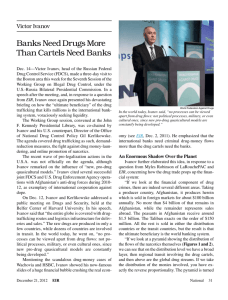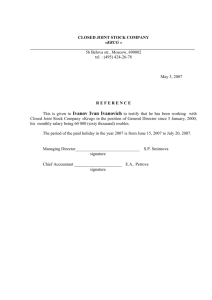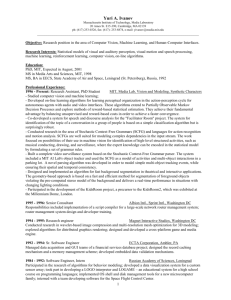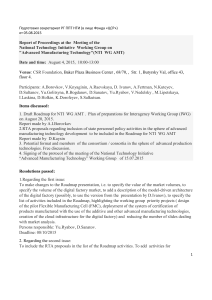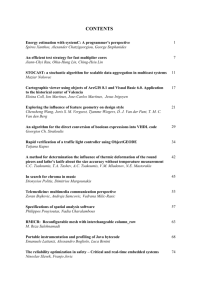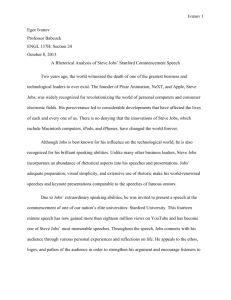Cooper 1 Irene Cooper Professor Ellen Santasiero ENG 416
advertisement
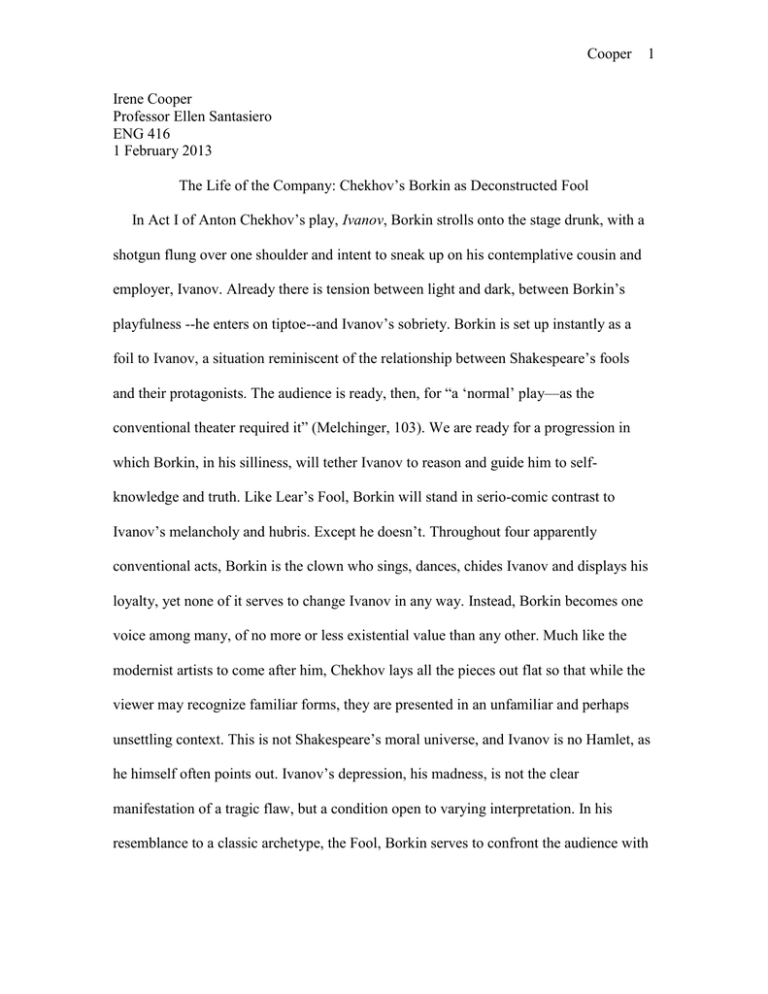
Cooper 1 Irene Cooper Professor Ellen Santasiero ENG 416 1 February 2013 The Life of the Company: Chekhov’s Borkin as Deconstructed Fool In Act I of Anton Chekhov’s play, Ivanov, Borkin strolls onto the stage drunk, with a shotgun flung over one shoulder and intent to sneak up on his contemplative cousin and employer, Ivanov. Already there is tension between light and dark, between Borkin’s playfulness --he enters on tiptoe--and Ivanov’s sobriety. Borkin is set up instantly as a foil to Ivanov, a situation reminiscent of the relationship between Shakespeare’s fools and their protagonists. The audience is ready, then, for “a ‘normal’ play—as the conventional theater required it” (Melchinger, 103). We are ready for a progression in which Borkin, in his silliness, will tether Ivanov to reason and guide him to selfknowledge and truth. Like Lear’s Fool, Borkin will stand in serio-comic contrast to Ivanov’s melancholy and hubris. Except he doesn’t. Throughout four apparently conventional acts, Borkin is the clown who sings, dances, chides Ivanov and displays his loyalty, yet none of it serves to change Ivanov in any way. Instead, Borkin becomes one voice among many, of no more or less existential value than any other. Much like the modernist artists to come after him, Chekhov lays all the pieces out flat so that while the viewer may recognize familiar forms, they are presented in an unfamiliar and perhaps unsettling context. This is not Shakespeare’s moral universe, and Ivanov is no Hamlet, as he himself often points out. Ivanov’s depression, his madness, is not the clear manifestation of a tragic flaw, but a condition open to varying interpretation. In his resemblance to a classic archetype, the Fool, Borkin serves to confront the audience with Cooper 2 its own expectations; rather than guide the protagonist to a single conclusion, he helps the audience to arrive at conclusions of its own. Chekhov’s Ivanov takes place on a country estate in Russia. Bibliographic material reads, “…so often in Chekhov’s mature stories there is no real plot, no dramatic emotional flare-up,…nothing changes…or promises to change” (OSU Bb). All information comes from the characters, not the action. Chekhov says, “[The characters] were the result of observations, of my study of life as it is. They are in my head, and I feel that not an inch of this is a lie, and not an iota, exaggeration” (Melchinger, 103). Psychiatrist Carl Jung proposed that every character in one’s dreams was a manifestation of the self, and it is possible to view Ivanov from the perspective that each character represents one of many conflicting attitudes within the self. Chekhov’s genius, however, is rendering these characters so human and funny and real and individual. Like The twentieth century poet William Carlos Williams, Chekhov is a scientist, a doctor with the surgical ability the excise the essential in human character. Borkin may be a Russian prototype or he may be a facet of Ivanov himself; he is most certainly an engaging and even complex character in his own right. Borkin is a provocateur and a pest, scaring Ivanov by sneaking up on him and pointing a gun at him, and badgering Ivanov with histrionic dialogue: “Nicholas, would you be sorry if I died?”, or, “Strictly speaking, of course, drinking is very harmful. Listen, it is very harmful, isn’t it? Is it? Is it?” (5,6). He begs for Ivanov’s attention, grabbing his hand and putting it to his own breast so that Ivanov may feel Borkin’s beating heart. Borkin dances around, he sings. However, just when one believes that this is the clown who will deliver Ivanov’s soul unto truth, Borkin turns his attention away from Ivanov’s melancholy and addresses practical matters. The Cooper 3 workmen must be paid, and the debts. Borkin admonishes Ivanov as “a man who has a cellar full of wine and no corkscrew”, and so begins to emerge as a pragmatic man of some ambition of his own (7). Borkin cares for Ivanov and is loyal (“I would do anything for you”), but is not attached to him. He is frustrated by Ivanov’s disposition: “If you were a normal man instead of a morbid hypochondriac we would have a million in a year” (8). Borkin is irritant and not agitator to Ivanov; Ivanov only snarls in Borkin’s direction. However, Borkin remains steady in his view: “I know that you are saying all this in a moment of irritation, and so I am not angry with you. Insult me as much as you please…It is time, though, to shake off that melancholy of yours; you’re not a schoolboy” (63). This pick-yourself-up-by-your-bootstraps talk is ineffectual. In the end, Borkin’s irrepressible optimism and good will cannot cajole Ivanov out of his depression. It is the combination of foolishness and pragmatism that gives Borkin his complexity as a character. When Borkin shows up for a party bearing homemade fireworks and kisses, Shabelski cries, “The life of the company! The moment he comes in the air feels livelier. Have you noticed it?” (37). He is tired at times, but never suffocates under the ennui that plagues the others. Borkin says, “(Swinging his arms) I can’t sit still! What tricks shall we be up to next, aunty? I am all on edge, Martha, absolutely exalted. (He sings)” (37). Chekhov imbues Borkin with a tremendous energy that pulses in sharp contrast to all else in the scene. The author says, “…the Russian excitability has a specific quality: it soon gives way to tiredness” (Melchinger, 106). Ivanov once had energy; however Chekhov states, “Ivanov’s state is not merely the result of his milieu and his circumstances but also the result of a process that most men pass through when their youth is past and they begin to age” (Melchinger, 106). Ivanov is stuck, he cannot pass Cooper 4 through. Borkin is either too young for the stage or simply doesn’t over think his existence in the manner of the intelligentsia, of which Ivanov is a member. Borkin sings, he is boisterously affectionate and his energy borders on a level of Springer spaniel, but he is also the only one who works. His financial schemes, while considered outlandish by many, denote a forward economic energy. Borkin suffers no existential or moral angst over the idea of pairing a young, rich widow with an old broke Count; to him it only makes sense. Money in general has no moral significance, only practical significance. Borkin doesn’t want to be highly esteemed, he wants to be rich. This is not to say, however, that he is without feeling or self-respect. He expresses his anger and frustration with Ivanov quite clearly early on: “Do you think I am going to stand on ceremony with you? Certainly not. I am not that kind of a man” (7). Later he will show genuine distress and concern that the Count lacks commitment to the marriage scheme: “If that is how you [the Count] feel about it, why have you turned an honest woman’s head?...How can you make a jest of such things? Do you think such behavior is honorable?” (47). Borkin is earnest in his schemes. He is a clown, but not a trickster. He may, too, be seen as the scientist or economist who seeks solutions to problems without considering too deeply their consequences. In Act III, Borkin casually and theoretically suggests biological warfare by rabies while munching cucumbers and herring in Ivanov’s library. Borkin’s potential to cause havoc is tempered by his being viewed as somewhat clownish. Borkin presents one view of how Ivanov might emerge from his crippling depression, perhaps not even a practical view, and certainly not a definitive one. Borkin’s outlook may even be the least accessible, as Borkin embodies the youthful zeal that Ivanov feels Cooper 5 he has lost forever. Borkin is active, and can make decisions. Chekhov writes of Ivanov, “He must, whether he wants to or not, make decisions…People like Ivanov don’t solve problems, they break down” (Melchinger, 107). In Act IV, Ivanov takes his own life and the play is over. In a Shakespearean tragedy, when the protagonist dies, everyone dies with him, either in reality or metaphorically. After Ivanov, however, one can imagine the other characters getting back to their lives pretty much as they left them. Chekhov writes, “I had a daring dream: to summarize everything that has ever been written about complaining, whining, and melancholic people and make a definitive end of it, terminating it all in Ivanov” (Melchinger, 108). Perhaps Chekhov terminated it in Ivanov, the play, but his dramatic statement is made through a polyphonic composition of voices, Borkin’s and the others as well as that of Ivanov himself. Borkin is a fool who can speak reason, but he is a passenger aboard ship, not the navigator. As Melchinger says, working within the “structural laws of the ‘wellmade play’” allowed Chekhov to deconstruct a traditional character archetype such as the Fool and present it in a new, thought-provoking manner that shifts the responsibility of interpretation to the audience, thereby allowing for a multiplicity of interpretation instead of a fixed resolution.
